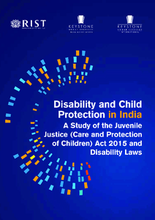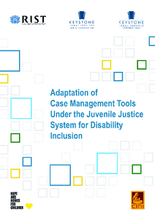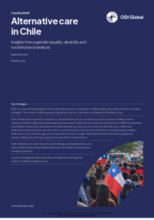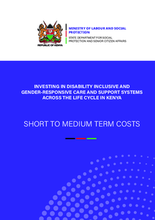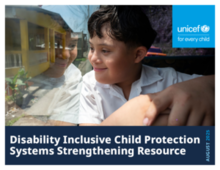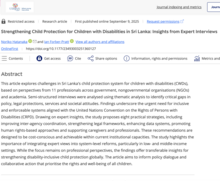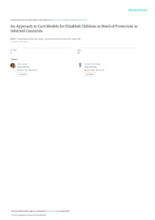Displaying 1 - 10 of 499
This study examined the relationship between disability type and service receipt among U.S. transition-age youth aging out of foster care, a population in which 53% have a diagnosed disability, across all U.S. states, Washington, DC, and Puerto Rico.
This article investigates the deinstitutionalisation of children with disabilities in times of armed conflict, taking the situation in Ukraine as a case study. It argues that a proper implementation of the right to independent living involves adopting a human rights-based approach that considers all the socio-economic rights of children with disabilities with due regard for the knowledge and expertise existing within families.
This report examines how India’s child protection laws interact with disability legislations, highlighting areas where greater focus is required to bring consonance to ensure that the rights of children with disabilities in need of care and protection are upheld.
This report presents suggested adaptations to include disability-related questions across three key case management tools under the Indian Juvenile Justice Act 2015 – the Social Investigation Report, Individual Care Plan and Case History Form. It also documents the consultative process undertaken for these adaptations and offers practical recommendations to help child protection systems better identify, support, and include children with disabilities.
This brief analyses the state of alternative care for children in Chile, highlighting key statistics, sectoral findings and areas for policy improvement. It is part of a broader analysis of gender equality, disability and social inclusion (GEDSI) in Chile. The analysis draws on existing literature, government reports and key informant interviews (KIIs) with stakeholders working in this area.
This resource presents a costed policy study on investing in disability-inclusive and gender-responsive community care and support systems across the life cycle in Kenya, developed by the Ministry of Labour and Social Protection.
The Disability Inclusive Child Protection Systems Strengthening Resource (DI-CPSS) is a practical guide for improving disability inclusion in child protection systems within the framework of the UNICEF child protection systems strengthening (CPSS) approach.
This article examines challenges in Sri Lanka’s child protection system for children with disabilities, drawing on insights from 11 professionals to identify critical gaps in policy, services, and societal attitudes. It proposes eight practical, cost-conscious strategies to strengthen disability-inclusive protection aligned with the UN CRPD, offering lessons for global child protection reform.
This case study showcases Kar Geno’s transition from institutional care to community-based support for children with disabilities in Siaya County, Kenya, guided by CTWWC and Catholic Relief Services. Through family reintegration, disability-inclusive services, and strong collaboration with government and civil society, Kar Geno has become a model for sustainable care reform, reintegrating nearly all resident children while continuing to provide accessible medical and psychosocial support through a community drop-in center.
Child protection systems have traditionally emphasized remedial services over prevention, often relying on uniform care models that fail to account for children’s diverse needs. This study examines the child protection systems of countries representing various welfare models and comparatively evaluates the practices for disabled children in need of protection in these systems.

